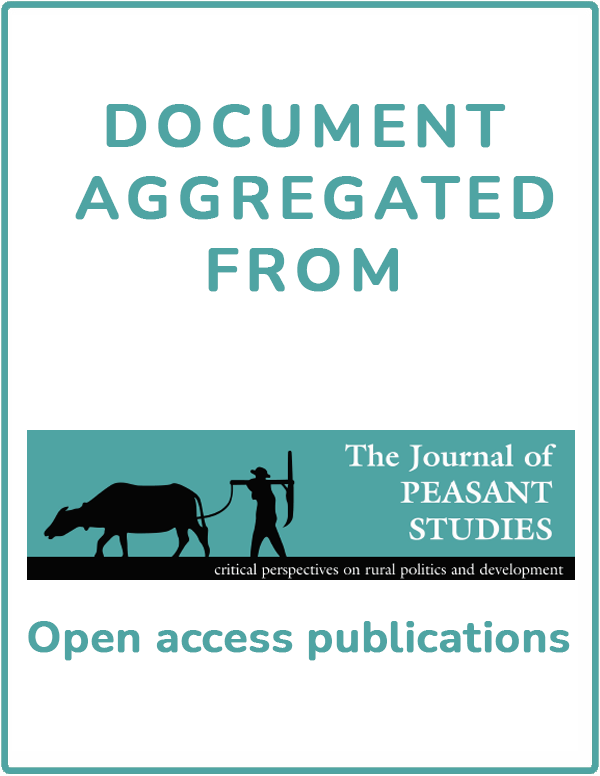Location
A leading journal in the field of rural politics and development, The Journal of Peasant Studies ( JPS) provokes and promotes critical thinking about social structures, institutions, actors and processes of change in and in relation to the rural world. It fosters inquiry into how agrarian power relations between classes and other social groups are created, understood, contested and transformed. JPS pays special attention to questions of ‘agency’ of marginalized groups in agrarian societies, particularly their autonomy and capacity to interpret – and change – their conditions.
The Journal encourages contributions from across the social sciences which:
-
question mainstream prescriptions;
-
interrogate orthodoxies in radical thinking;
-
explore theoretical, policy and political alternatives.
The Journal welcomes contributions on a wide range of contemporary and historical questions and perspectives related to rural politics and development; on issues that confront peasants, farmers, rural labourers, migrant workers, indigenous peoples, forest dwellers, pastoralists, fisherfolk and rural youth – both female and male – in different parts of the world.
In addition to articles and special issues, the Journal publishes Grassroots Voices – views that are written and presented in a non-academic style but provide important insights and information relevant to critical rural development studies; and Reviews of important theoretical or policy-oriented books or films written for diverse audiences. For more information about Grassroots Voices and Reviews, see here.
JPS was founded in 1973 on the initiative of Terence J. Byres and its first editors were Byres, Charles Curwen and Teodor Shanin who are among the most important agrarian political economists.
Members:
Resources
Displaying 6 - 10 of 21(Un)making the upland: resettlement, rubber and land use planning in Namai village, Laos
This paper highlights how farmers in a northern Lao village transformed their customary land rights – in the face of incoherent overlapping state territorialization attempts – into a territorial strategy to secure their land tenure. By planting rubber, some villagers have engaged in a crop boom to lay claim to land which has recently been zoned for upland rice cultivation (and conservation) as part of a state-led land use planning initiative.
Gender, politics and sugarcane commercialisation in Tanzania
This article explores relationships between state, corporate capital and local stakeholders in the political economy of sugarcane from a gender perspective. The findings, based on empirical research at the site of Tanzania’s largest sugarcane producer pre- and post-privatisation, provide insights into the degree to which the estate-outgrower model can be regarded as ‘inclusive’ for women and men. Three aspects of commercial sugarcane production are analysed: land tenure, labour and leadership within canegrowers’ associations.
Capital, labor, and gender: the consequences of large-scale land transactions on household labor allocation
Contemporary large-scale land transactions (LSLTs), also called land grabs, are historically unprecedented in their scale and pace. They have provoked robust scholarly debates, yet studies of their gender-differentiated impacts remain more rare, particularly when it comes to how changes in control over land and resources affect women's labor, and thereby their livelihoods and well-being.
Land grabbing and the making of an authoritarian populist regime in Hungary
How do authoritarian populist regimes emerge within the European Union in the twenty-first century? In Hungary, land grabbing by oligarchs have been one of the pillars maintaining Prime Minister Orbán’s regime. The phenomenon remains out of the public purview and meets little resistance as the regime-controlled media keeps Hungarians ‘distracted’ with ‘dangers’ inflicted by the ‘enemies of the Hungarian people’ such as refugees and the European Union.
Gender and generation in Southeast Asian agro-commodity booms
This article introduces the Special Issue on ‘Gender and generation in agrarian and environmental transformation in Southeast Asia’. The contributions to this collection focus on the intersecting dynamics of gender, generation and class in Southeast Asian rural communities engaging with expanding capitalist relations, whether in the form of large-scale corporate land acquisition or other forms of penetration of commodity economy. Gender and especially generation are relatively neglected dimensions in the literature on agrarian and environmental transformations in Southeast Asia.



